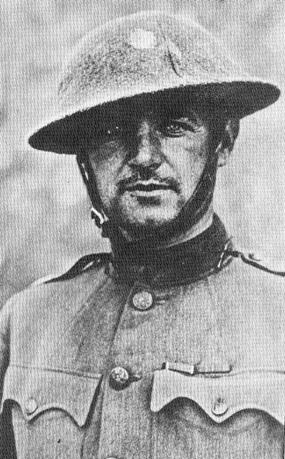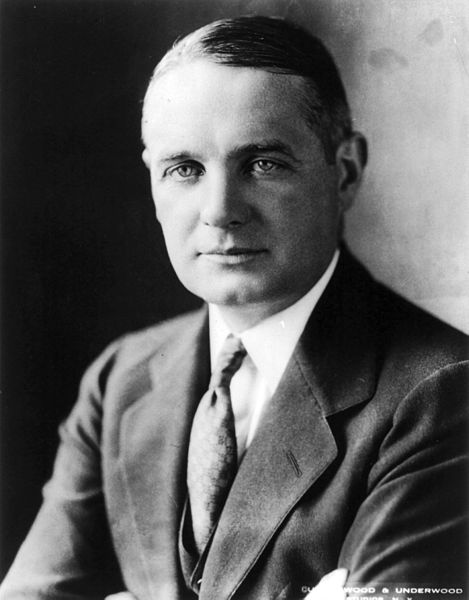William
Joseph ("Wild Bill") Donovan (January 1, 1883
– February 8, 1959) was a United States soldier, lawyer,
intelligence officer and diplomat. Donovan is best remembered
as the wartime head of the Office of Strategic Services
(OSS), a precursor to the Central Intelligence Agency, during
World War II. He is also known as the "Father of American
Intelligence" and the "Father of Central Intelligence".
A
decorated veteran of World War I, General Donovan is the
only person to have received the four highest awards in
the United States: The Medal of Honor, the Distinguished
Service Cross, the Distinguished Service Medal, and the
National Security Medal. He is also a recipient of the
Silver Star and Purple Heart, as well as an honorary British
knighthood and decorations from several nations for his
service during both World Wars.
Biography
Early
life
Of
Irish descent, Donovan was born in Buffalo, New York to
first generation immigrants Anna Letitia "Tish"
Donovan (née Lennon) and Timothy P. Donovan, of
Ulster and County Cork origins respectively. His grandfather
Timothy O'Donovan (Sr.) was from the town of Skibbereen,
being raised there by an uncle, a parish priest, and married
Donovan's grandmother Mary Mahoney, who belonged to a
propertied family of substantial means which disapproved
of him. They would move first to Canada and then to New
York, where their son Timothy (Jr.), Donovan's father,
would attempt to engage in a political career, but with
little success.
William
Joseph attended St. Joseph's Collegiate Institute and
Niagara University before starring on the football team
at Columbia University. On the field, he earned the nickname
"Wild Bill", which would remain with him for
the rest of his life. Donovan graduated from Columbia
in 1905 and was a member of the Phi Kappa Psi fraternity,
as well as the Knights of Malta.
Donovan
was a graduate of Columbia Law School and became an influential
Wall Street lawyer.
In
1912, Donovan formed and led a troop of cavalry of the
New York State Militia. This unit was mobilized in 1916
and served on the U.S.-Mexico border during the American
government's campaign against Pancho Villa.
World
War I

Donovan
as a Major with the Fighting
69th in France in 1918.
During
World War I, Major Donovan organized and led the 1st battalion
of the 165th Regiment of the 42nd Division, the federalized
designation of the famed 69th New York Volunteers, (the
"Fighting 69th"). In France one of his aides
was poet Joyce Kilmer, a fellow Columbia College alumnus.
For his service near Landres-et-St. Georges, France, on
14 and 15 October 1918, he received the Medal of Honor.
By the end of the war he received a promotion to colonel,
the Distinguished Service Cross and two Purple Hearts
(the full text of his Medal of Honor citation can be found
further below).
Between
the wars
From
1922 to 1924, he was US Attorney for the Western District
of New York, famous for his energetic enforcement of Prohibition.
In 1924 President Calvin Coolidge named Donovan to the
United States Department of Justice's Antitrust Division
as a deputy assistant to Attorney General Harry M. Daugherty.

Donovan
in 1924, during his time
in the Department of Justice
Donovan
ran unsuccessfully as a Republican for Lieutenant Governor
of New York in 1922, and for Governor of New York in 1932.
Assisting Donovan in his 1932 campaign was journalist
James J. Montague, who served as "personal adviser
and campaign critic."
World
War II
During
the interwar years, Donovan traveled extensively in Europe
and met with foreign leaders including Benito Mussolini
of Italy. Donovan openly believed during this time that
a second major European war was inevitable. His foreign
experience and realism earned him the attention and friendship
of President Franklin D. Roosevelt. The two men were from
opposing political parties, but were similar in personality.
Because of this, Roosevelt came to highly value Donovan's
insights. Following Germany's invasion of Poland in September
1939 and the start of World War II in Europe, President
Roosevelt began to put the United States on a war footing.
This was a crisis of the sort that Donovan had predicted,
and he sought out a responsible place in the wartime infrastructure.
On the recommendation of Donovan's friend United States
Secretary of the Navy Frank Knox, Roosevelt gave him a
number of increasingly important assignments. In 1940
and 1941, Donovan traveled as an informal emissary to
Britain, where he was urged by Knox and Roosevelt to gauge
Britain's ability to withstand Germany's aggression. During
these trips, Donovan met with key officials in the British
war effort, including Winston Churchill and the directors
of Britain's intelligence services. Donovan returned to
the US confident of Britain's chances and enamored with
the possibility of founding an American intelligence service
modeled on that of the British.
OSS
On
July 11, 1941, Donovan was named Coordinator of Information
(COI). America's foreign intelligence organizations at
the time were fragmented and isolated from each other.
The Army, Navy, Federal Bureau of Investigation (FBI),
United States Department of State, and other interests
each ran their own intelligence operations, the results
of which they were reluctant to share with the other departments.
Donovan was the nominal director of this unwieldy system,
but was plagued over the course of the next year with
jurisdictional battles. Few of the leaders in the intelligence
community were willing to part with any of the power that
the current ad hoc system granted them. The FBI, for example,
under the control of Donovan's rival J. Edgar Hoover,
insisted on retaining its autonomy in South America.
Nevertheless,
Donovan began to lay the groundwork for a centralized
intelligence program. It was he who organized the COI's
New York headquarters in Room 3603 of Rockefeller Center
in October, 1941 and asked Allen Dulles to head it; the
offices Dulles took over had been the location of the
operations of Britain's MI6.
In
1942, the COI became the Office of Strategic Services
(OSS) and Donovan was returned to active duty in his World
War I rank of colonel (by war's end, he would be promoted
to major general). Under his leadership the OSS would
eventually conduct successful espionage and sabotage operations
in Europe and parts of Asia, but continued to be kept
out of South America as a result of Hoover's hostility
to Donovan. In addition, the OSS was blocked from the
Philippines by the antipathy of General Douglas MacArthur,
the commander of the Southwest Pacific Theater.
For
many years, the operations of the OSS remained secret,
but in the 1970s and 1980s, significant parts of the OSS
history were declassified and became public record.
As
World War II began to wind to a close in early 1945, Donovan
began to focus on preserving the OSS beyond the end of
the war. After President Roosevelt's death in April, however,
Donovan's political position, which had thrived because
of his personal relationship to the President, was substantially
weakened. Although he argued forcefully for the OSS's
retention, he found himself opposed by numerous opponents,
including President Harry S. Truman, who personally disliked
Donovan, as well as J. Edgar Hoover, who viewed the OSS
as competition for his goal to expand the FBI's investigative
operations internationally. Public opinion turned against
Donovan's efforts when conservative critics rallied against
the intelligence service that they called an 'American
Gestapo.' After Truman disbanded the OSS in September
1945, Donovan returned to civilian life. Various departments
of the OSS survived the agency's dissolution, however,
and less than two years later the Central Intelligence
Agency was founded, a realization of Donovan's hopes for
a centralized peacetime intelligence agency.
Role
in formation of the CIA
Donovan
did not have an official role in the newly formed CIA
but with his protégé Allen Dulles and others,
he was instrumental in its formation. Having led the OSS
during World War II, Donovan’s opinion was especially
influential as to what kind of intelligence organization
was needed as a bi-polar post-war world began to take
shape. Although he was a force to be reckoned with, his
idea for consolidating intelligence met with strong opposition
from the State, War and Navy Departments and J. Edgar
Hoover. President Truman was inclined to create an organization
that would gather and disseminate foreign intelligence;
Donovan argued that the new agency should also be able
to conduct covert action. Truman was unenthusiastic about
this additional authority, but Donovan's arguments prevailed
and were reflected in the National Security Act of 1947
and the Central Intelligence Agency Act of 1949. In 1946,
Truman appointed Rear Admiral Sidney Souers, USNR, as
the first Director of Central Intelligence. This was an
important first step but the actual creation of the CIA
required another persuasive voice, that of Hoyt Vandenberg.
In 1947 Rear Admiral Roscoe H. Hillenkoetter was appointed
as the first Director of the CIA.
Post-war
era
After
the war ended, Donovan reverted to his lifelong role as
a lawyer to perform one last duty: he served as special
assistant to chief prosecutor Telford Taylor at several
trials following the main Nuremberg War Crimes Tribunal
in Germany. There, he had the personal satisfaction of
seeing the Nazi leaders responsible for the torture and
murder of captured OSS agents brought to justice. For
his World War II service, Donovan received the Distinguished
Service Medal, the highest American military decoration
for outstanding non-combat service. He also received an
honorary British knighthood.
At
the conclusion of the Nazi war criminal trials, Donovan
returned to Wall Street and his highly successful law
firm, Donovan, Leisure, Newton & Irvine. He remained
always available to postwar Presidents who requested his
advice on intelligence matters.
In
1949, he became chairman of the newly founded American
Committee on United Europe, which worked to counter the
new Communist threat to Europe by promoting European political
unity.
In
1953, President Dwight Eisenhower appointed Donovan Ambassador
to Thailand. He served in that capacity until his resignation
in 1954.
Donovan's
son, David Rumsey Donovan, was a naval officer who served
with distinction in World War II. His grandson, William
James Donovan, served as an enlisted soldier in Vietnam
and is also buried at Arlington National Cemetery.
Death
and legacy
Donovan
died from complications of vascular dementia on February
8, 1959, at Walter Reed Army Medical Center, in Washington,
D.C. at the age of 76, and is buried in Section 2 of Arlington
National Cemetery.
President
Dwight D. Eisenhower referred to him as "the Last
Hero", which later became the title of a biography
of him. After his death, Donovan was awarded the Freedom
Award of the International Rescue Committee (not, as some
biographies state, the "Medal of Freedom", a
different award).
The
law firm he founded, Donovan, Leisure, Newton & Irvine
was dissolved in 1998.
His
home Chapel Hill near Berryville, Virginia, was listed
on the National Register of Historic Places in 2004.[12]
Major General Donovan is a member of the Military Intelligence
Hall of Fame.
Source:
http://en.wikipedia.org/wiki/William_J._Donovan
